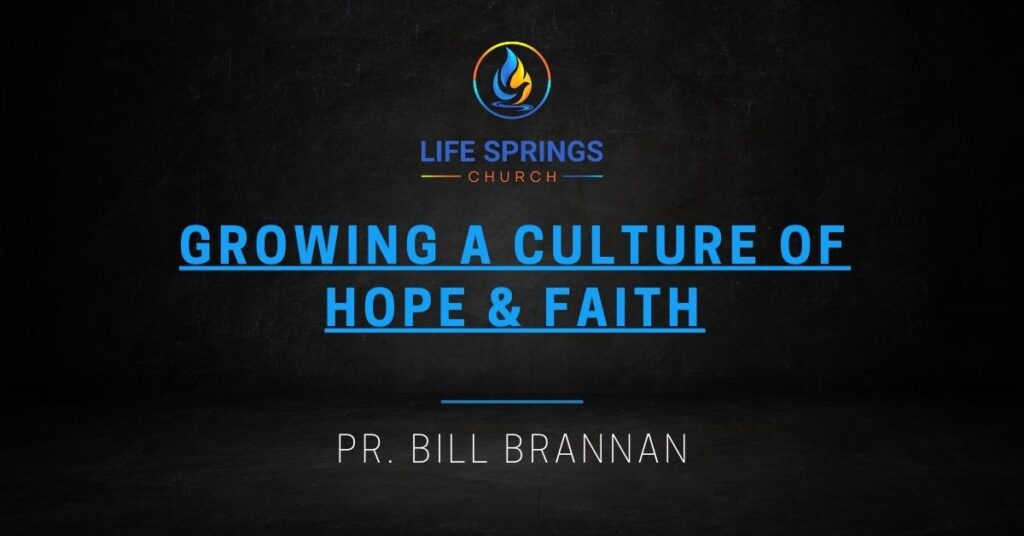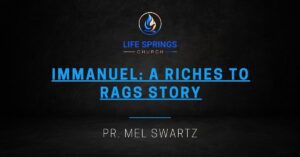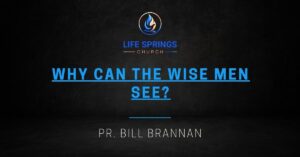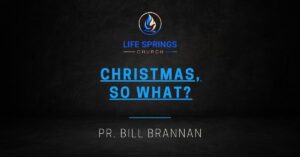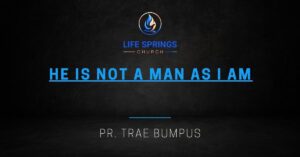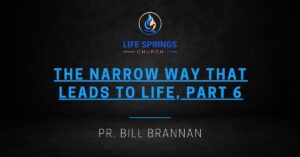The Secret to Unshakeable Faith: Cultivating a Culture of Hope

In a world filled with challenges, Pastor Bill Brannan shares profound insights on how to cultivate unshakeable faith through a culture of hope. Drawing from scripture and personal experiences, he emphasizes the importance of prayer, community, and perseverance in maintaining faith amidst adversity.
Growing a Culture of Hope and Faith
Creating a culture of hope and faith requires intentionality. It begins with recognizing the profound impact of our environment on our spiritual growth. When we foster an atmosphere of encouragement and support, we enable individuals to thrive in their faith journeys.
Community plays a crucial role in this process. When believers gather with a shared purpose, they create a space where hope can flourish. This collective faith encourages individuals to step out, share their burdens, and uplift one another.

Photo by Helena Lopes on Unsplash
Nurturing Relationships
Relationships within the church are foundational to nurturing hope and faith. When we invest in one another, we cultivate trust and understanding. This leads to deeper connections that can weather life’s storms.
- Encouragement: Regularly affirming each other’s strengths can boost morale.
- Accountability: Holding each other accountable fosters growth and perseverance.
- Prayer Support: Praying for one another creates a bond of spiritual solidarity.
Reading Scriptures
Engaging with scripture is essential for building a culture of hope and faith. The Bible offers timeless truths that guide us in our daily lives. By immersing ourselves in God’s word, we gain wisdom and understanding.
Reading scripture should be approached with an open heart, ready to receive guidance. It’s not merely about acquiring knowledge; it’s about transformation. As we digest the word, it shapes our perspectives and actions.

Photo by James Coleman on Unsplash
Practical Approaches to Scripture Reading
- Daily Devotions: Set aside time each day for personal reflection.
- Group Studies: Engage in discussions with others to gain different insights.
- Memorization: Commit verses to memory for encouragement during tough times.
Mark 6:1-6 Analysis
In Mark 6:1-6, we see an intriguing dynamic at play. Jesus returns to his hometown, where initial amazement quickly turns to skepticism. This passage illustrates how familiarity can breed contempt and quench faith.
The people’s disbelief stifles the miraculous works that could have taken place. Their lack of faith limits Jesus’ ability to perform mighty works. This serves as a powerful reminder of the importance of faith in experiencing God’s power.

Photo by Edward Cisneros on Unsplash
Key Takeaways from Mark 6
- Expectancy: Approach God with an attitude of expectancy to see His works.
- Overcoming Familiarity: Guard against becoming too familiar with the sacred.
- Community Impact: Our collective faith can either hinder or enhance God’s work among us.
Luke 18:1-8 Insights
Luke 18:1-8 presents the parable of the persistent widow. This story emphasizes the necessity of persistence in prayer and the importance of maintaining faith, even when faced with challenges.
The widow’s unwavering determination serves as a model for us. Jesus uses this parable to highlight that our relationship with God is relational, not transactional. He desires for us to bring our requests to Him continually.

Photo by Mika Baumeister on Unsplash
Lessons from the Parable
- Persistence in Prayer: Maintain a consistent prayer life, even amid discouragement.
- God’s Justice: Trust that God hears and will respond to our cries.
- Community Support: Encourage one another to remain steadfast in faith.
Theological Confessions Explained
Theological confessions serve as foundational truths within the Christian faith. They articulate core beliefs that define our understanding of God and His purposes. However, it is essential to recognize that faith extends beyond mere intellectual assent to these doctrines.
True faith involves a relational aspect with God. It is not enough to simply know the right answers; we must live them out in our daily lives. This living faith is what transforms hearts and communities.

Photo by Papaioannou Kostas on Unsplash
Importance of Theological Confessions
- Guidance: They provide a roadmap for understanding God’s character.
- Unity: Confessions help unify believers around shared beliefs.
- Accountability: They hold us accountable to live out our faith authentically.
God is Not a Machine Concept
Understanding that God is not a machine is crucial for developing a healthy faith. Many people approach God with a transactional mindset, expecting Him to respond to their prayers in a predetermined manner. However, God desires a relationship with us.
This relational aspect means that God may not always answer prayers as we expect. His timing and methods can differ from our own, requiring us to trust His wisdom and goodness.

Photo by Sasha Freemind on Unsplash
Implications of a Relational God
- Trust in His Plan: Recognize that God’s understanding of our needs surpasses our own.
- Embrace the Journey: Faith is a journey, not just a destination.
- Seek Relationship: Prioritize a personal relationship with God over mere requests.
A Culture of Faith Development
Developing a culture of faith requires intentional actions that promote spiritual growth. This culture is not built overnight but is cultivated through consistent practices and shared experiences.
Fostering an environment where faith can thrive involves creating opportunities for worship, service, and fellowship. These experiences reinforce our beliefs and encourage us to live out our faith in tangible ways.

Photo by Edwin Andrade on Unsplash
Strategies for Cultivating Faith
- Regular Worship: Engage in communal worship to strengthen collective faith.
- Service Projects: Participate in community service to demonstrate faith in action.
- Mentorship: Encourage mentorship relationships to foster spiritual growth.
Moses and the Quail Story
The story of Moses and the quail reveals a profound lesson about human desires and divine provision. In Numbers 11:1-15, the Israelites express their longing for meat, lamenting their circumstances despite the miraculous manna they receive daily. This complaint reaches Moses, who feels overwhelmed by the burden of leadership.
Moses’ prayer reflects his despair, yet it is also a model of turning to God in vulnerability. God responds not with condemnation but with provision. He sends quail to satisfy the people’s cravings, demonstrating His compassion even in their complaints. This story illustrates that God acknowledges our needs and desires, even when we struggle with gratitude.
Lessons from Moses’ Experience
- Honesty in Prayer: Moses’ candid conversation with God shows the importance of authenticity in our prayers.
- Divine Provision: God’s response reminds us that He can meet our needs, even when we doubt.
- Community Impact: The collective complaints of the Israelites highlight how negativity can spread among a community.
The Mixed Multitude Discussion
The concept of the mixed multitude, as mentioned in Numbers 11:4, plays a crucial role in understanding the dynamics of faith and culture. This group, composed of both Israelites and non-Israelites, brought diverse perspectives but also challenges. Their complaints about food set off a chain reaction among the Israelites, leading to widespread dissatisfaction.
This scenario emphasizes the influence of a mixed community. When a few voices express discontent, it can quickly resonate with others, revealing the contagious nature of complaint and negativity. The mixed multitude serves as a warning: we must be vigilant about the voices we allow to shape our culture.

Photo by Vonecia Carswell on Unsplash
Reflections on the Mixed Multitude
- Influence of Voices: Recognize the impact of both positive and negative voices in our communities.
- Shared Responsibility: Each member contributes to the overall culture, for better or worse.
- Call to Unity: Strive for a unified spirit that focuses on gratitude and faith rather than complaints.
Moses and the Elders Overview
The appointment of the seventy elders in Numbers 11:16-30 marks a significant moment in Moses’ leadership journey. Faced with overwhelming demands, Moses brings his concerns to God, who instructs him to gather the elders. God then imparts His Spirit upon them, enabling them to share in the burdens of leadership.
This delegation of authority not only alleviates Moses’ load but also fosters a culture of shared leadership. The elders become instruments of God’s guidance among the people, demonstrating that leadership is not a solitary endeavor. This act of empowerment is essential for cultivating a healthy community.

Photo by Fr. Barry Braum on Unsplash
Key Insights from the Appointment of Elders
- Empowerment: Sharing leadership responsibilities enhances community strength.
- Spiritual Anointing: God’s Spirit equips individuals for service and leadership.
- Collective Wisdom: A diverse leadership team brings varied insights and experiences.
The Faith Jesus Will Find
The question of faith resonates deeply in the current cultural landscape. Jesus often encounters varying levels of faith, from skepticism to profound belief. In Luke 18:8, He asks, “When the Son of Man comes, will He find faith on the earth?” This inquiry challenges us to reflect on our own faith and the collective faith of our communities.
Faith is not merely an individual pursuit; it is a communal journey. We must cultivate an environment where faith thrives, encouraging one another to believe in the impossible. The legacy of faith is built through shared experiences, testimonies, and the reinforcement of hope.

Photo by Omar Lopez on Unsplash
Building a Culture of Faith
- Encouragement: Regularly uplift one another’s faith through testimonies and prayer.
- Expectation: Approach God with anticipation for miracles and answers to prayer.
- Community Engagement: Foster an inclusive environment where everyone feels valued and heard.
A Culture of Faith Reflections
Developing a culture of faith involves intentional practices that reinforce our beliefs. This culture is nurtured through worship, prayer, and acts of service. Each of these elements contributes to a collective identity rooted in faith and hope.
In our gatherings, we must prioritize creating spaces where individuals feel empowered to express their faith. Whether through worship, teaching, or community outreach, every interaction should reflect our commitment to cultivating a culture of faith.

Photo by Sincerely Media on Unsplash
Strategies for Cultivating Faith Culture
- Intentional Worship: Design services that lead to genuine encounters with God.
- Prayer Initiatives: Organize prayer groups to seek God collectively.
- Service Opportunities: Engage the community in acts of service that demonstrate faith in action.
Growing a Culture of Hope and Faith (Continued)
As we continue to cultivate a culture of hope and faith, it is vital to recognize the power of collective engagement. Our shared experiences can inspire hope and strengthen faith within our communities. The more we interact with one another, the more we can encourage growth and resilience.
Creating spaces for dialogue and sharing testimonies can enhance our collective faith experience. By celebrating victories, big and small, we foster an environment where hope flourishes. This culture of encouragement can act as a counter to the negativity that often pervades our world.

Photo by Anthony DELANOIX on Unsplash
Steps to Enhance Hope and Faith
- Storytelling: Share personal testimonies of faith and hope to inspire others.
- Mentorship Programs: Pair seasoned believers with those seeking to grow in faith.
- Community Events: Host events that promote fellowship and shared experiences.
Every Member Doing Their Part
The principle of every member doing their part is foundational to a thriving community. In Ephesians 4:16, Paul emphasizes that the growth of the body occurs through each member’s contribution. This collective effort fosters unity, strength, and purpose.
Each individual has unique gifts and talents that, when utilized, enhance the overall health of the community. Encouraging members to step into their roles not only empowers them but also strengthens the entire body of Christ. We must embrace the diversity of gifts within our community and celebrate each contribution.

Photo by Campaign Creators on Unsplash
Encouraging Active Participation
- Identify Gifts: Help individuals discover and develop their spiritual gifts.
- Promote Involvement: Create opportunities for service and engagement within the community.
- Celebrate Contributions: Recognize and appreciate the efforts of every member.
Growing a Culture of Hope & Faith
(Preaching Outline)
1) I am excited because of a deep conviction in my heart that God is awakening a faith in us that can change the spiritual trajectory of people’s lives and the nation.
a) 1 Timothy 6:12 (NKJV) — 12 Fight the good fight of faith, lay hold on eternal life, to which you were also called and have confessed the good confession in the presence of many witnesses.
b) Jude 3 (NKJV) — 3 Beloved, while I was very diligent to write to you concerning our common salvation, I found it necessary to write to you exhorting you to contend earnestly for the faith which was once for all delivered to the saints.
c) What is the fight of faith?
2) Exploring several scriptures that may not give a clear enough answer to satisfy our desire for simplicity, but will, I believe, stir something in our spirits toward a spiritual awakening.
a) Mark 6:1–6 (NKJV) — 1 Then He went out from there and came to His own country, and His disciples followed Him. 2 And when the Sabbath had come, He began to teach in the synagogue. And many hearing Him were astonished, saying, “Where did this Man get these things? And what wisdom is this which is given to Him, that such mighty works are performed by His hands! 3 Is this not the carpenter, the Son of Mary, and brother of James, Joses, Judas, and Simon? And are not His sisters here with us?” So they were offended at Him. 4 But Jesus said to them, “A prophet is not without honor except in his own country, among his own relatives, and in his own house.” 5 Now He could do no mighty work there, except that He laid His hands on a few sick people and healed them. 6 And He marveled because of their unbelief. Then He went about the villages in a circuit, teaching.
b) Luke 18:1–8 (NKJV) — 1 Then He spoke a parable to them, that men always ought to pray and not lose heart, 2 saying: “There was in a certain city a judge who did not fear God nor regard man. 3 Now there was a widow in that city; and she came to him, saying, ‘Get justice for me from my adversary.’ 4 And he would not for a while; but afterward he said within himself, ‘Though I do not fear God nor regard man, 5 yet because this widow troubles me I will avenge her, lest by her continual coming she weary me.’ ” 6 Then the Lord said, “Hear what the unjust judge said. 7 And shall God not avenge His own elect who cry out day and night to Him, though He bears long with them? 8 I tell you that He will avenge them speedily. Nevertheless, when the Son of Man comes, will He really find faith on the earth?”
c) His question (verse 8b) is intended as a warning that believers should take heed not to let their faith waver, notwithstanding His apparent delay in coming. So He concludes the parable with a powerful summons to His followers to maintain true belief in Him, through whom the Father will give final victory[1]
d) James 1:2-8 – Lack wisdom, ask, but do not doubt.
e) Numbers 11:10–15 (NKJV) — 10 Then Moses heard the people weeping throughout their families, everyone at the door of his tent; and the anger of the Lord was greatly aroused; Moses also was displeased. 11 So Moses said to the Lord, “Why have You afflicted Your servant? And why have I not found favor in Your sight, that You have laid the burden of all these people on me? 12 Did I conceive all these people? Did I beget them, that You should say to me, ‘Carry them in your bosom, as a guardian carries a nursing child,’ to the land which You swore to their fathers? 13 Where am I to get meat to give to all these people? For they weep all over me, saying, ‘Give us meat, that we may eat.’ 14 I am not able to bear all these people alone, because the burden is too heavy for me. 15 If You treat me like this, please kill me here and now—if I have found favor in Your sight—and do not let me see my wretchedness!”
3) The faith Jesus will find.
a) Jude 19–21 (NKJV) — 19 These are sensual persons, who cause divisions, not having the Spirit. 20 But you, beloved, building yourselves up on your most holy faith, praying in the Holy Spirit, 21 keep yourselves in the love of God, looking for the mercy of our Lord Jesus Christ unto eternal life.
b) Esther & Mordecai
c) David & Goliath
d) Jonathan & his armorbearer
e) The Spirit from Moses poured out on the Elders.
4) Mission & Vision
a) Vision: To restore human flourishing through the gospel of Jesus Christ.
b) Mission: Becoming a community that restores the world by reproducing the life of Christ with imperfect people growing in grace and serving through the gift of the Spirit.
c) The fall of leaders in the church today.
d) Duncan Campbell and the Revival on the Isle of Lewis.
5) What can you do to fulfill the mission and vision of LSCC?
a) Nurture the Spirit and culture.
b) Worship
c) Pray
d) Engage
i) Maybe join the outreach committee.
ii) Build Friendships
iii) Reach out – the net.
e) Own and live the vision and mission of the church.
f) GROW A CULTURE OF HOPE AND FAITH
[1] Norval Geldenhuys, Commentary on the Gospel of Luke: The English Text with Introduction, Exposition and Notes, The New International Commentary on the Old and New Testament (Grand Rapids, MI: Wm. B. Eerdmans Publishing Co., 1952), 447.

